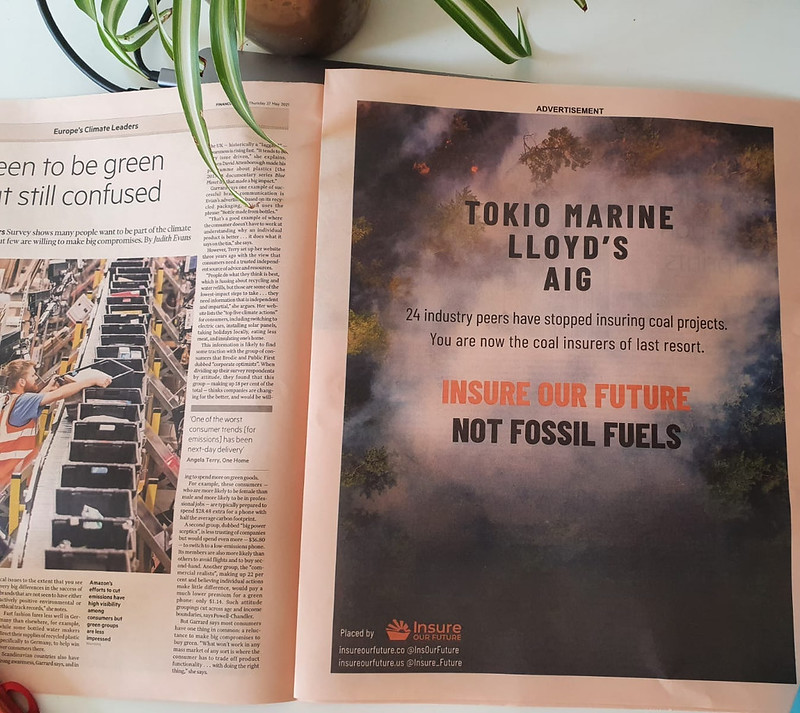5 environmental NGOs have sent a letter to 50 financial institutions, which are major shareholders of Tokio Marine, to urge the company to completely stop underwriting coal-fired power projects. For details, please see the text of the letter below.
**
July 14, 2021
Dear Tokio Marine Holdings Shareholders,
A Request to Engage with Tokio Marine
to Completely Stop Underwriting Coal-fired Power Projects
Japan Center for a Sustainable Environment and Society (JACSES)
Kiko Network
Friends of the Earth Japan
350.org Japan
Mekong Watch
On June 28, Tokio Marine Holdings (hereinafter referred to as Tokio Marine) held its Annual General Meeting (AGM). Japanese environmental NGO staff members participated in this meeting as shareholders and asked questions about the company’s climate change measures, but the response from the company’s management was unfortunately neither based on scientific evidence nor relevant. Therefore, we are sending this request to 50 financial institutions, which are major shareholders of Tokio Marine, to engage with the company to completely stop underwriting coal-fired power projects.
It was on June 25, that one of Japan’s major non-life insurance companies and Tokio Marine’s rival company, MS&AD Insurance Group Holdings (hereinafter referred to as MS&AD), announced a policy (*1) to completely stop underwriting new coal-fired power projects without exceptions. Thus, at Tokio Marine’s AGM, Yuki Tanabe, Program Director at the Japan Center for a Sustainable Environment and Society (JACSES) asked, “Following MS&AD’s new policy announcement, is Tokio Marine planning to announce a similar policy?” Tokio Marine’s management responded that it has not underwritten any coal projects since its coal policy was established in September 2020 (*2), nevertheless, since the Japanese government’s energy policy does not prohibit the construction of coal-fired power plants, the company will retain the current exceptions in its policy.
Takayoshi Yokoyama, Team Leader of 350.org Japan asked, “Although the term ‘Paris Agreement’ has not been mentioned at today’s AGM, is Tokio Marine developing its business in line with the long-term goals of the Paris Agreement?” Tokio Marine’s management responded that the company is in line with the long-term goals of the Paris Agreement for the reason that it complies with the Japanese government’s goal of reducing greenhouse gases to 46% in 2030, compared to 2013 levels.
Outside the AGM venue, environmental NGOs urged Tokio Marine to completely stop underwriting new coal-fired power projects. Insure Our Future, an international campaign calling on insurance companies to stop underwriting and investing in fossil fuel-related businesses, has so far launched a campaign site targetting Tokio Marine (*3), sent an Open Letter to Tokio Marine’s Group CEO (*4), and placed a full-page ad in the Financial Times (*5).


According to the “Net Zero by 2050, A Roadmap for the Global Energy Sector” report published by the International Energy Agency (IEA) on May 18, 2021, new fossil fuel mining operations cannot be approved and the electricity sector should have net-zero emissions globally by 2040 (*6). Therefore, in order to achieve net-zero emissions in 2050, it is necessary to end underwriting not only for coal-fired power generation but also for new fossil fuel mining and fossil fuel power generation projects, including oil and gas. 28 major insurance and reinsurance companies worldwide have already announced that they have ended or limited underwriting coal projects, and Tokio Marine, which is still underwriting coal, is lagging behind.
It has been pointed out that the Japanese government’s goal to reduce greenhouse gas emissions by 46% is not consistent with the 1.5 degrees Celsius goal of the Paris Agreement (*7). Therefore, even if Tokio Marine complies with the Japanese government’s reduction targets, it still doesn’t align with the Paris Agreement. Furthermore, since 33.3% of Tokio Marine’s premium income is generated by its overseas businesses (*8), it is still insufficient even if it complies with the Japanese government’s domestic reduction targets.
Therefore, we are requesting Tokio Marine’s major shareholders to engage with Tokio Marine to stop underwriting new fossil fuel businesses, including coal-fired power generation, to align its underwriting policies with the long-term goals of the Paris Agreement.
We would appreciate it if you could fill out our Response Form and send us your institution’s policies and opinions regarding this request to the contact person below by August 31, 2021. If you wish to discuss these issues further, we also welcome the opportunity to arrange a follow-up conversation online at your convenience.
Thank you for your consideration and we look forward to receiving your response.
*1: https://www.ms-ad-hd.com/en/news/news_topics/news_topics-20210625_en/main/0/link/EN_Release_20210625.pdf
*2: https://www.tokiomarinehd.com/en/release_topics/release/k82ffv0000008juk-att/20200928_e_v2.pdf
*3: https://pollutingtheplanet.com/
*4: https://pollutingtheplanet.com/open-letter-to-the-tokio-marine-holdings-group/
*5: https://pollutingtheplanet.com/climate-campaigners-protest-aig-lloyds-of-london-and-tokio-marine-as-coal-insurers-of-last-resort/
*6: International Energy Agency (IEA), (2021), “Net Zero by 2050, A Roadmap for the Global Energy Sector”, p. 20, https://iea.blob.core.windows.net/assets/0716bb9a-6138-4918-8023-cb24caa47794/NetZeroby2050-ARoadmapfortheGlobalEnergySector.pdf
*7: Climate Action Tracker (CAT), (2021), “1.5℃-consistent benchmarks for enhancing Japan’s 2030 climate target”, p. 4, https://climateactiontracker.org/documents/841/2021_03_CAT_1.5C-consistent_benchmarks_Japan_NDC.pdf
*8: p. 37, https://www.tokiomarinehd.com/ir/event/l6guv3000000c5fm-att/2021_Notice_of_Convocation_j.pdf (in Japanese)




